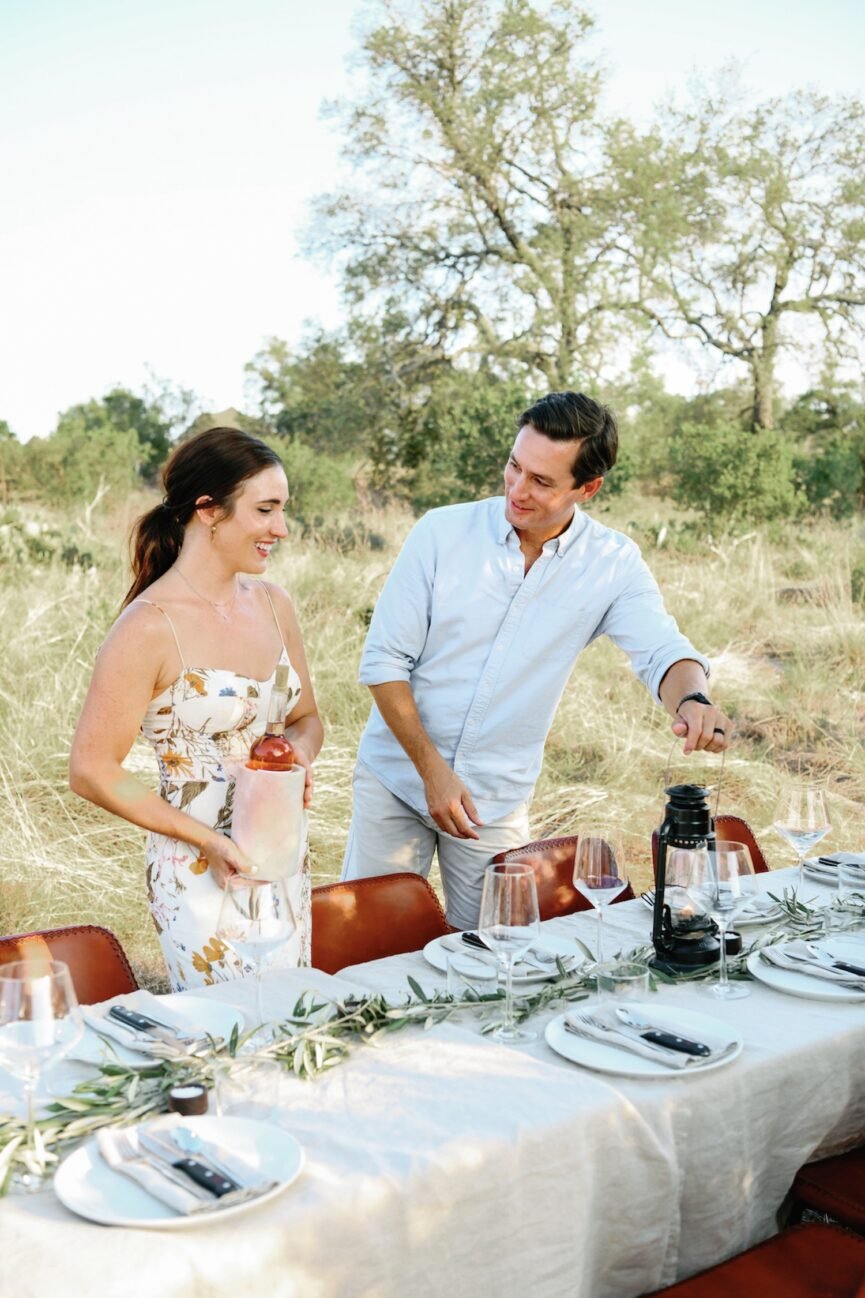I’ll preface this piece with the self-awareness that by no means am I a relationship expert. As a matter of fact, every single thing I’m about to outline I have either failed at or could stand to improve in. I’d venture to guess you might fall into one of the two categories as well, because—hello, we’re human.
As I think about what makes a relationship truly thrive, I recall the various conversations and tools I’ve received from individual and couples therapy, not to mention any relationship-focused book or podcast I’ve digested. It always comes back to the question, how strong is the foundation?
With a secure and solid foundation, a relationship is poised to grow. We all know establishing healthy habits with movement, nutrition, and sleep is crucial to feeling our best, and the same is true for relationships. Implementing core habits helps establish the building blocks for trust, intimacy, and lasting connection.
Featured image by Michelle Nash.


What Are Healthy Relationship Habits?
Think of these as daily actions or behaviors that promote mutual respect, trust, and emotional well-being. These habits shape the tone and strength of a relationship over time with consistency and the ability to shift and pivot as needed. In any relationship I’ve been in, I’ve felt most secure and solid when consistency was a priority.
Read on for 8 Key Healthy Relationship Habits
Prioritize Communication
I think we can all relate to this one. Anytime I’ve had a misunderstanding or conflict in a relationship, I can usually point back to a lack of communication. We’re not always going to get this right, but as long as we make it a priority and learn how we can be better with our partner, we’ll move in the right direction.
- Schedule regular check-ins to discuss feelings, needs, and concerns.
- Practice active listening: hear to understand, not to respond. Repeat what you heard your partner say so you’re sure you’ve heard them. Don’t be afraid to ask for clarification.
- Use “I” statements to express emotions without blame.
Practice Gratitude
We have to celebrate the wins, too. Who doesn’t love hearing when something you’ve done was well-received or you’ve made their day?
- Express appreciation for both big gestures and small actions. Tell your partner how they made you feel, don’t hide it.
- Create a gratitude ritual, like sharing one thing you’re thankful for daily. In my last relationship, every month on a set day we sent one another a list of things we appreciated and loved about our partner. It started as a joke and turned into a little love letter to each other, which kept the spark alive.
Maintain Individuality
It’s so important to have your own thing outside of your relationship. If you’ve listened to or read anything by Ester Perel, you know that she preaches this sentiment often. We cannot be everything to our partner. As someone who is highly independent and requires space and alone time to recharge outside of the relationship, this one is crucial for me.
- Encourage personal growth by pursuing hobbies and interests independently.
- Respect boundaries and give each other space when needed.
Prioritize Quality Time Together
Let’s face it—life can get hectic as we juggle work, kids, and moving schedules. But quality time can mean something different to each of us. Even if we only have 30 minutes in a day to spend together, think about how you can use that time to be the most present within it. One of my favorite things my last partner and I did while I was on the road traveling, was to carve out just five minutes to FaceTime and stay connected. Sometimes, it doesn’t take much to have a significant impact.
- Plan intentional date nights or shared activities without distractions.
- Be present by unplugging from phones and other interruptions.
Build Emotional Intimacy
I’ve loved when my partners have opened up and shared more about their life, sharing how or why they feel a certain way, or big life goals they have—and I’ve loved when I’ve felt safe to do the same. It always makes me feel more connected to develop that respect for each other’s heart.
- Share vulnerabilities and dreams to deepen your bond.
- Develop rituals, like morning coffee chats or evening walks, to connect daily.
Resolve Conflicts Constructively
Next to prioritizing communication, this might be the second-most important habit to understand and evolve in. Conflict is inevitable; how we navigate conflict determines the quality and health of the relationship. I’ve appreciated how Julie and John Gottman of The Gottman Institute approach “fighting right” and ensuring conflict leads to compassion for and connection with one another.
- Approach disagreements with curiosity instead of defensiveness.
- Focus on solutions rather than assigning blame.
- Remember: You’re a team.
- Take breaks during heated arguments to cool off and gain perspective.
Celebrate Wins Together
I don’t know about you, but in my relationships, your wins are my wins and vice versa. I love it when my partner shines and soars, and I want the same sentiment reciprocated. This, to me, is what it feels like to be a part of a team.
- Acknowledge achievements, milestones, and everyday victories as a team.
- Celebrate both individual and shared successes to foster mutual support.
Focus on Physical Intimacy
Physical touch might not be your love language, but it’s important to be able to communicate our intimacy needs and how we can best meet them for one another. Prioritize this in your communication and weekly or daily check-ins. It’s ok to share what is working for you and what isn’t, so long as you’re approaching this with kindness and curiosity, and even some levity.
- Maintain touch through hugs, hand-holding, and affection.
- Communicate openly about physical needs and desires.
Why Healthy Habits Matter in the Long Run
We all want to feel safe in our relationships. Healthy habits provide a secure foundation for emotional and physical vulnerability. They do a great job at preventing resentment and misunderstandings by fostering open dialogue, which strengthens the relationship’s ability to navigate challenges together.
Tips for Building Healthy Relationship Habits
- Start small: Incorporate one or two habits at a time to avoid feeling overwhelmed.
- Be consistent: Commit to daily or weekly practices to make habits stick.
- Adapt over time: Reassess and evolve habits as your relationship grows and changes.
How to Handle Setbacks
We won’t always get it right. We’ll fumble, have a bad day, revert to less-than-favorable behavior and completely miss the mark. When that happens, remember:
- Be forgiving: Understand that progress is not always linear.
- Communicate openly: Talk through challenges and reaffirm your commitment to growth. Communication is important, but affirmation goes just as far.
- Seek help when needed: Consider therapy or counseling for added support. Couples’ therapy greatly helped me to understand my partner’s point of view. Having someone neutral guide us through conflict was game-changing and gave us new tools to approach future obstacles ourselves.
One of my favorite Instagram follows is author Yung Pueblo, who just wrote about his “5 Irreplaceable Lessons from 9 Years of Marriage” in a recent Substack. He focused on humility in the post, but it was his first takeaway that resonated most. He said:
“The main thing all relationships need is balance. Both people should be giving and receiving. If one person is doing all the emotional heavy lifting, all the forgiving, all the problem-solving and leading, then things will start to turn sideways for the relationship. You both should feel like equals in the relationship. Even though you both have different strengths and preferences, you should both feel that your power is helping design the culture of what love looks like in your home. You are both leaders in your relationship, even if that leadership looks different for each of you.”
Intentionally making time and space to cultivate these healthy habits will give your relationship this balance that Pueblo references. Starting small, communicating often, and pivoting as needed will build a foundation that allows your relationship to grow and thrive, which we all want and deserve.






